Stories from and about library student employees and interns.
Student Stories
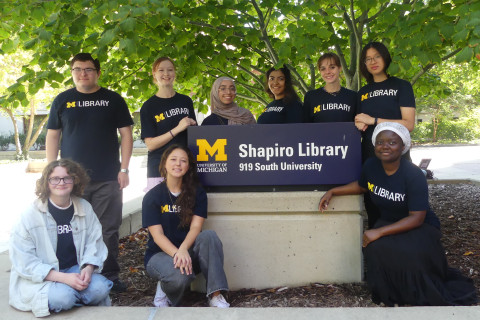
Posts in Student Stories
Showing 71 - 80 of 144 items
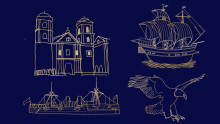
- Charlotte Grace Fater
Creating the "Hispanofilipino Literature: Translation as Repa(t)r(i)ation" exhibit as part of the Michigan Library Scholars internship.
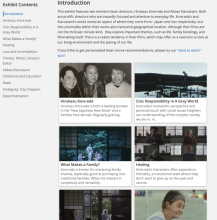
- Yifei Yao
During the summer of COVID-19, Michigan Library Scholar Yifei Yao contributed to the Askwith International Media Awareness Project by curating an online exhibit that highlights Asian film collections. This remote working experience provided an opportunity for Yifei to learn and grow. Through combining her passion for film and the new professional skills she learned, Yifei became more clear and confident in her career path after graduation.
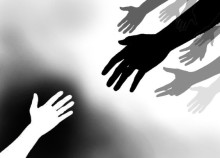
- Sara M Trop
The Michigan Library Scholars application jumped out at me back in February. I’m a rising junior studying economics & communications with a minor in Spanish, hoping to ultimately work for a non-profit one day. I saw the Askwith project and was immediately drawn to it because the majority of my classes this past semester were on globalization. Slowly I began to understand the necessity of being culturally aware and maintaining diversity in a world where homogeneity is often expected. Knowing I had been confined to my own “single-story,” or was truly only familiar with my home country, became an impediment to my perspective on the global community. The MLS program stood out to me then, and now, because I got to be part of a team of classmates and mentors working to end narrow-mindedness at UM.
•
- Sophie Wenyi Shao
Michigan Library Scholars intern Sophie Shao provides a glimpse into her experience of creating an animated video about the library's services and resources while working in a remote environment. This project underscores the importance of accessibility with a multilingual lens as well as the need for communication and problem solving in this new era of virtual work.
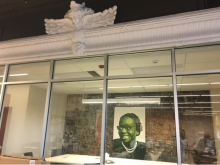
- Kathryn R Berringer
According to The Western Architect, four hundred and fifty million bricks were used in construction in Detroit in 1916. Among the brick buildings featured in this reporting is the Victor Theatre, located near the Ford factory that was, at the time, the largest manufacturing site in the world in Highland Park, an autonomous city in the center of Detroit. Today, this building is the main location of the Ruth Ellis Center, a nonprofit organization providing social and medical services to LGBTQ youth in metropolitan Detroit. While the exterior of the building is now unrecognizable – the façade covered over in the intervening years – certain interior spaces in the theater have been preserved: the detailed proscenium arch framing the stage-turned-conference-room and the upstairs dance hall where, prior to the novel coronavirus pandemic and enforced social distancing, youth gathered to share meals and vogue during the Center’s drop-in hours.
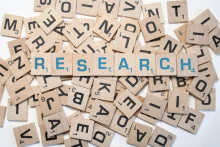
- Mary Olivia Rolfes
From the beginning of my time as a transfer student to the University of Michigan in the Fall of 2019, I have been interested in both engaging with the transfer community and improving the overall transfer student experience. When preparing for this big transition over the summer of 2019, I was most concerned with adjusting socially and academically to a new school. However, when I actually got here, I found there were many other, more hidden aspects of campus life that I had to figure out on my own. For example: Which buildings require swipe access? Where can I scan a document? What is the “UgLi,” and is it a good place for group work?
I think we don’t often consider how all these little questions and struggles add up to create the transfer student experience. Transfer student success is often measured by quantitative academic markers; students themselves are concerned with adjusting academically and socially. I’m sure I’m not alone in saying that concerns about how to use the library as a transfer were far from the first thing on my mind. So, when looking for social science research opportunities this fall, I was intrigued by a position that entailed analyzing the specific library needs of transfer and commuter students. I saw it as an opportunity to engage with the transfer student experience through the unique, and often undervalued, lens of the library.
Ultimately, this interest led to me joining the Library Research & Evaluation team as a Research Assistant, as part of the Library Engagement Fellows Program. Through this position, I was able to utilize and strengthen my social science research skills through a project I am personally invested in and passionate about. Additionally, this position exposed me to library functioning and the specific resources offered by the University of Michigan Library.
I think we don’t often consider how all these little questions and struggles add up to create the transfer student experience. Transfer student success is often measured by quantitative academic markers; students themselves are concerned with adjusting academically and socially. I’m sure I’m not alone in saying that concerns about how to use the library as a transfer were far from the first thing on my mind. So, when looking for social science research opportunities this fall, I was intrigued by a position that entailed analyzing the specific library needs of transfer and commuter students. I saw it as an opportunity to engage with the transfer student experience through the unique, and often undervalued, lens of the library.
Ultimately, this interest led to me joining the Library Research & Evaluation team as a Research Assistant, as part of the Library Engagement Fellows Program. Through this position, I was able to utilize and strengthen my social science research skills through a project I am personally invested in and passionate about. Additionally, this position exposed me to library functioning and the specific resources offered by the University of Michigan Library.
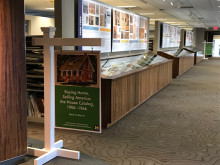
- Rachel Aviva London
Over the past academic year, Anthony Erebor, Lyse Messmer, and I have worked as library engagement fellows. We have been working with Librarian Rebecca Price to exhibit a growing collection of 20th-century house catalogs held in the Art, Architecture and Engineering Special Collections. The catalogues, which focus on residential construction in the Midwest from the 1910s through the post-war building boom of the 1950s and 60s, tell many stories: the historical story of Michigan's industrial past transitioning from lumber to automobile; an architectural story about changing patterns and arrangements of domestic space; a sociological story of the gender roles within and outside the household; a racial story of exclusion and expectations; an urban story of the development of suburbia, a transportation story of the impact of the family car form and road systems; a technological story as appliances were integrated into the home; a materials story from construction to furnishing to decoration; and a communications tory in the visual presentation of house plans and their promise.
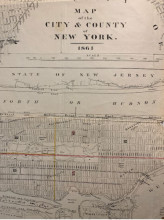
- Leonard William Bopp
An 1861 map of New York City, now worn with age, the delicate paper permanently creased from its life in a file-folder, shows the familiar landscape of upper Manhattan. Two hand-drawn lines, remnants of its previous handling, cross the page – a red line runs along sixth avenue, and a yellow one cuts across 86th Street, intersecting just below the reservoir. Aside from a few cosmetic changes - “Bloomingdale Road” has been straightened out into Broadway, the Great Lawn is now decorated with baseball fields – much of this landscape, detailed over a century ago, remains today. For over a century, millions of people have traversed these same paths, unknowingly following each other through the unremarkable progression of days and years.
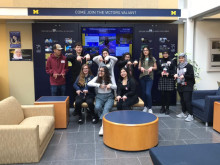
- Una Jakupovic
PILOT is a student organization founded in 2010 with the mission of empowering students from underrepresented communities. We work to develop campus leaders through various project initiatives, one of which is Dreams2Reality. Dreams2Reality is a social justice outreach program that hosts bi-weekly workshops with first- and second-year Metro Detroit high school students that center around different social justice topics, as well as on-campus Dream Day. Our program aims to build community between multi-ethnic students of African, Latinx, Asian, Middle Eastern, and European descent from under-resourced high schools, to promote social awareness and consciousness about topics including, but not limited to, social identities, privilege, and discrimination.
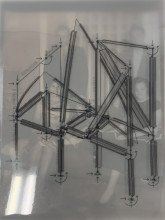
- Maite Iribarren
Idealized Cuban Family Structures is a research based project that uses humor, the Cuban Family Code, the ASCE Steel Construction Manual, and my own family history to start a conversation about social engineering. It is presented as three sculptures, or “corrective devices” for the steel structure shown above, which represents my family’s dynamics. The sculptures will be accompanied by a series of 2D graphic works which assist the viewer in understanding the absurd translation of my family’s interpersonal relationships into this steel structure. The 2D pieces will also sarcastically illustrate where the family went “wrong” according to the Code. Humorous caricatures of engineering drawings depict where the corrective devices would bolt into the family structure and how the corrective devices would physically work to “fix” the family.